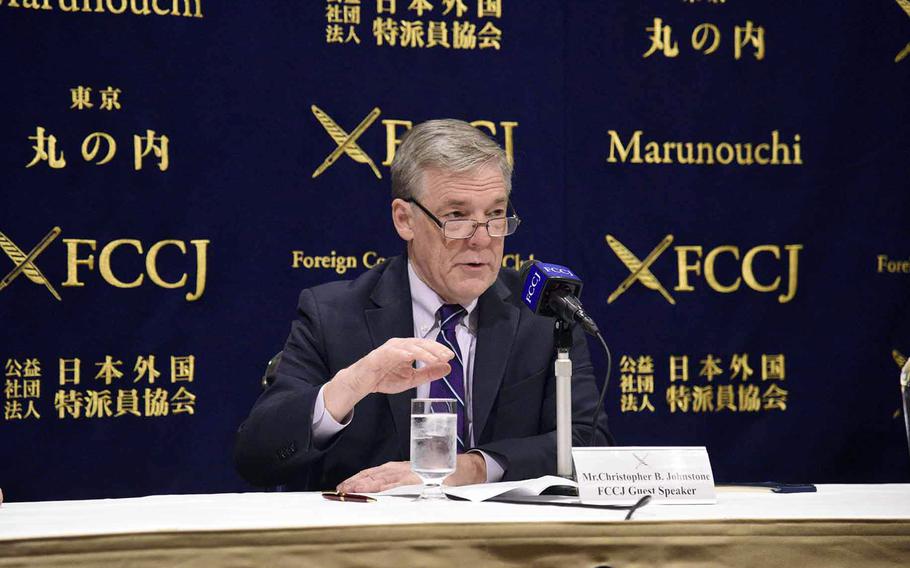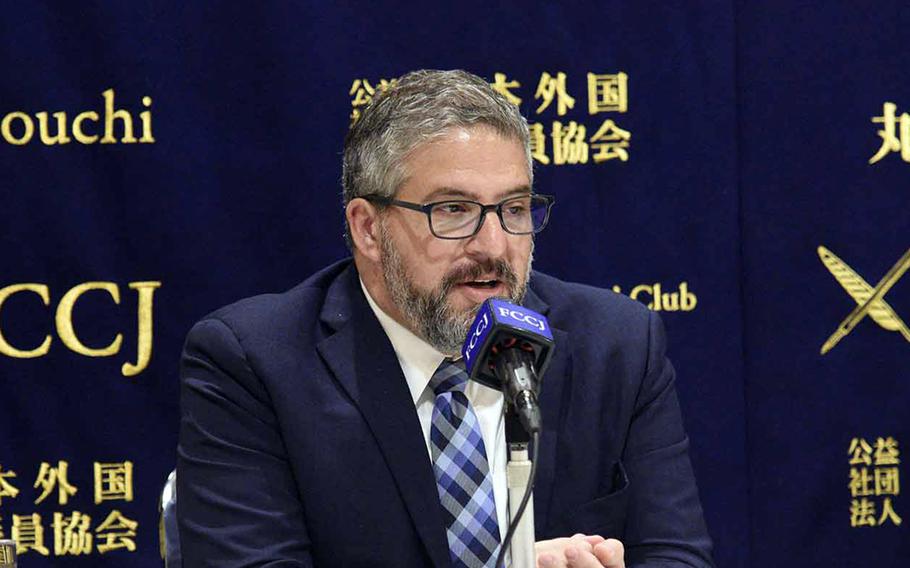
Christopher Johnstone, a managing principal for The Asia Group, speaks to reporters at the Foreign Correspondents' Club of Japan in Tokyo, Nov. 19, 2024. (Jeremy Stillwagner/Stars and Stripes)
TOKYO — President-elect Donald Trump will probably prize deals with individual Indo-Pacific countries over multinational partnerships, a strategy likely to allow China to drive a wedge between the U.S. and its allies, two strategy advisers said this week.
Trump may depart significantly from President Joe Biden’s agenda for curtailing Beijing’s influence, although both see China as the primary U.S. competitor, Christopher Johnstone, a managing principal at The Asia Group, a strategic advisory firm, said Monday at the Foreign Correspondents’ Club of Japan.
The Biden administration pursued cooperation among its allies and partners, for example, by increasing cooperation and ties between the U.S., Japan and South Korea. Trump is more likely to pursue individual agreements and pressure allies into spending more on defense.
“He brings a deep skepticism about allies and has tended to view them as free riders who have often taken advantage of the United States,” Johnstone told reporters.
Japan this year announced a plan to increase defense spending to 2% of gross domestic product, but Johnstone expects Trump to press for at least 3%.
Trump during his first term pushed South Korea to pay more of the cost to keep American forces stationed in the country or face their withdrawal.
“I think we have to assume that’s also a conversation that could return,” Johnstone said.
Trump has at times been a strong supporter of Taiwan, but also expressed displeasure with its defense spending and “questioned the importance of Taiwan to the United States,” he said.
Faced with Trump’s plans to use tariffs and other trade deals to distance the U.S. economy from China, Beijing is likely to retaliate, Johnstone said.
“[China is] likely to seek to divide Japan, South Korea, the Philippines and Australia, possibly by offering separate inducements and separate incentives related to trade and investment; to attempt to divide the progress that’s been made,” he said.
China may also test Trump’s commitment to Taiwan and keeping open the South China Sea through increased military activity in the area, Johnstone said.
China views Taiwan, a functionally democratic island separated from the mainland by the 110-mile-wide Taiwan Strait, as a breakaway province that must be reclaimed, by force if necessary.

Abraham Denmark, a senior adviser for the Asia Group, speaks to reporters at the Foreign Correspondents' Club of Japan in Tokyo, Nov. 19, 2024. (Jeremy Stillwagner/Stars and Stripes)
Abraham Denmark, a senior adviser for the Asia Group, said Taiwan presents the greatest potential for conflict. Chinese President Xi Jinping has set 2027 as the year Beijing should “ready to take Taiwan by force,” Denmark said.
“It doesn’t mean that they will try to do that,” he said. “But it does, I think, signify that the potential for conflict in East Asia, if not high, is a very real possibility that we cannot ignore.”
Most Indo-Pacific nations seek stable relationships with both countries, Denmark added.
“I expect countries to continue to hedge for the most part and try to maintain as robust a relationship they can with the United States, while trying to muddle through with China,” he said.